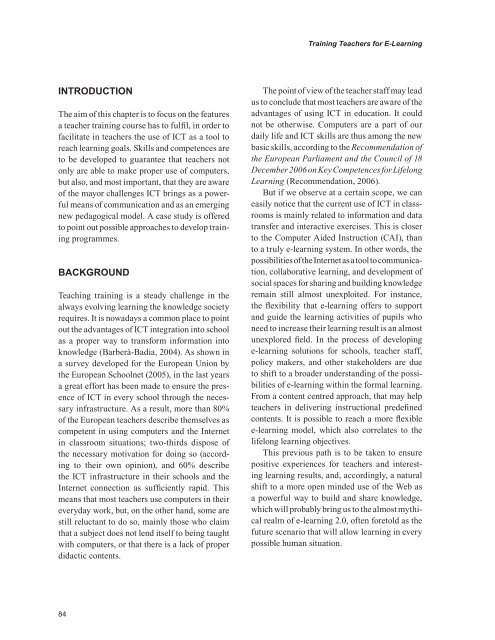Advances in E-learning-Experiences and Methodologies
You also want an ePaper? Increase the reach of your titles
YUMPU automatically turns print PDFs into web optimized ePapers that Google loves.
Tra<strong>in</strong><strong>in</strong>g Teachers for E-Learn<strong>in</strong>g<br />
IntroductIon<br />
The aim of this chapter is to focus on the features<br />
a teacher tra<strong>in</strong><strong>in</strong>g course has to fulfil, <strong>in</strong> order to<br />
facilitate <strong>in</strong> teachers the use of ICT as a tool to<br />
reach learn<strong>in</strong>g goals. Skills <strong>and</strong> competences are<br />
to be developed to guarantee that teachers not<br />
only are able to make proper use of computers,<br />
but also, <strong>and</strong> most important, that they are aware<br />
of the mayor challenges ICT br<strong>in</strong>gs as a powerful<br />
means of communication <strong>and</strong> as an emerg<strong>in</strong>g<br />
new pedagogical model. A case study is offered<br />
to po<strong>in</strong>t out possible approaches to develop tra<strong>in</strong><strong>in</strong>g<br />
programmes.<br />
BAckground<br />
Teach<strong>in</strong>g tra<strong>in</strong><strong>in</strong>g is a steady challenge <strong>in</strong> the<br />
always evolv<strong>in</strong>g learn<strong>in</strong>g the knowledge society<br />
requires. It is nowadays a common place to po<strong>in</strong>t<br />
out the advantages of ICT <strong>in</strong>tegration <strong>in</strong>to school<br />
as a proper way to transform <strong>in</strong>formation <strong>in</strong>to<br />
knowledge (Barberà-Badia, 2004). As shown <strong>in</strong><br />
a survey developed for the European Union by<br />
the European Schoolnet (2005), <strong>in</strong> the last years<br />
a great effort has been made to ensure the presence<br />
of ICT <strong>in</strong> every school through the necessary<br />
<strong>in</strong>frastructure. As a result, more than 80%<br />
of the European teachers describe themselves as<br />
competent <strong>in</strong> us<strong>in</strong>g computers <strong>and</strong> the Internet<br />
<strong>in</strong> classroom situations; two-thirds dispose of<br />
the necessary motivation for do<strong>in</strong>g so (accord<strong>in</strong>g<br />
to their own op<strong>in</strong>ion), <strong>and</strong> 60% describe<br />
the ICT <strong>in</strong>frastructure <strong>in</strong> their schools <strong>and</strong> the<br />
Internet connection as sufficiently rapid. This<br />
means that most teachers use computers <strong>in</strong> their<br />
everyday work, but, on the other h<strong>and</strong>, some are<br />
still reluctant to do so, ma<strong>in</strong>ly those who claim<br />
that a subject does not lend itself to be<strong>in</strong>g taught<br />
with computers, or that there is a lack of proper<br />
didactic contents.<br />
The po<strong>in</strong>t of view of the teacher staff may lead<br />
us to conclude that most teachers are aware of the<br />
advantages of us<strong>in</strong>g ICT <strong>in</strong> education. It could<br />
not be otherwise. Computers are a part of our<br />
daily life <strong>and</strong> ICT skills are thus among the new<br />
basic skills, accord<strong>in</strong>g to the Recommendation of<br />
the European Parliament <strong>and</strong> the Council of 18<br />
December 2006 on Key Competences for Lifelong<br />
Learn<strong>in</strong>g (Recommendation, 2006).<br />
But if we observe at a certa<strong>in</strong> scope, we can<br />
easily notice that the current use of ICT <strong>in</strong> classrooms<br />
is ma<strong>in</strong>ly related to <strong>in</strong>formation <strong>and</strong> data<br />
transfer <strong>and</strong> <strong>in</strong>teractive exercises. This is closer<br />
to the Computer Aided Instruction (CAI), than<br />
to a truly e-learn<strong>in</strong>g system. In other words, the<br />
possibilities of the Internet as a tool to communication,<br />
collaborative learn<strong>in</strong>g, <strong>and</strong> development of<br />
social spaces for shar<strong>in</strong>g <strong>and</strong> build<strong>in</strong>g knowledge<br />
rema<strong>in</strong> still almost unexploited. For <strong>in</strong>stance,<br />
the flexibility that e-learn<strong>in</strong>g offers to support<br />
<strong>and</strong> guide the learn<strong>in</strong>g activities of pupils who<br />
need to <strong>in</strong>crease their learn<strong>in</strong>g result is an almost<br />
unexplored field. In the process of develop<strong>in</strong>g<br />
e-learn<strong>in</strong>g solutions for schools, teacher staff,<br />
policy makers, <strong>and</strong> other stakeholders are due<br />
to shift to a broader underst<strong>and</strong><strong>in</strong>g of the possibilities<br />
of e-learn<strong>in</strong>g with<strong>in</strong> the formal learn<strong>in</strong>g.<br />
From a content centred approach, that may help<br />
teachers <strong>in</strong> deliver<strong>in</strong>g <strong>in</strong>structional predef<strong>in</strong>ed<br />
contents. It is possible to reach a more flexible<br />
e-learn<strong>in</strong>g model, which also correlates to the<br />
lifelong learn<strong>in</strong>g objectives.<br />
This previous path is to be taken to ensure<br />
positive experiences for teachers <strong>and</strong> <strong>in</strong>terest<strong>in</strong>g<br />
learn<strong>in</strong>g results, <strong>and</strong>, accord<strong>in</strong>gly, a natural<br />
shift to a more open m<strong>in</strong>ded use of the Web as<br />
a powerful way to build <strong>and</strong> share knowledge,<br />
which will probably br<strong>in</strong>g us to the almost mythical<br />
realm of e-learn<strong>in</strong>g 2.0, often foretold as the<br />
future scenario that will allow learn<strong>in</strong>g <strong>in</strong> every<br />
possible human situation.


